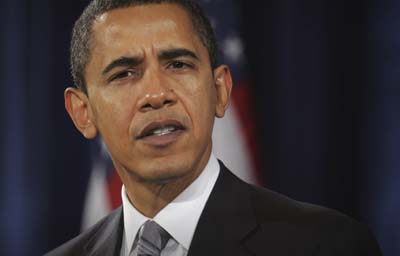PAMELA HESS and LOLITA BALDOR
WASHINGTON
Promising to protect the United States while adhering to its core human values, President-elect Barack Obama formally unveiled his intelligence team Friday, praising their integrity, management skills and willingness to tell him the truth.
“We must adhere to our values as diligently as we protect our safety with no exceptions,” Obama said.
Obama picked retired Adm. Dennis Blair as the national intelligence director and Leon Panetta to head the CIA.
He called them “public servants with unquestioned integrity, broad experience, and strong managers with the core pragmatism that we need in dangerous times.”
Obama said he has given the men the clear charge to restore the United States’ record on human rights.
“I was clear throughout this campaign and was clear throughout this transition that under my administration the United States does not torture. We will abide by the Geneva Conventions. We will uphold our highest ideals,” he said.
Obama said that the country learned “tough lessons” under the Bush administration, and he will demand intelligence assessments “grounded solely in the facts, and not seek information to suit any ideological agenda.”
Blair, a former head of the U.S. Pacific Command, pledged to uphold the standards that Obama articulated “and that the American people have a right to expect.”
Blair won high marks for countering terrorism in southeast Asia after the Sept. 11, 2001, attacks. He worked closely with foreign partners in crafting offensives that crippled the Jemaah Islamiyah terror faction in Indonesia and the Abu Sayyaf group in the Philippines.
Panetta, a former congressman, White House chief of staff and budget director with no direct intelligence experience, will have the president’s “complete trust and substantial clout,” Obama said.
“He has handled intelligence daily at the very highest levels, and time and again he has demonstrated sound judgment, grace under fire, and complete integrity,” he said.
Panetta said he would work to assuage a Congress bruised from eight years of abrasive relations with the Bush administration and promised “to form the kind of partnership we need if we’re to win the war on terror.”
Obama praised the intelligence professionals working at 16 U.S. agencies even as he criticized the current administration for directing them in carrying out harsh interrogation and secret rendition policies.
“They have served in the shadows, saved American lives, advanced our interests, and earned the respect of a grateful nation,” Obama said.
Obama is also tapping John Brennan to head homeland security and counterterrorism on the National Security Council. Michael Leiter will remain on as the director of the national Counterterrorism Center. And outgoing National Intelligence Director Michael McConnell will serve on Obama’s Foreign Intelligence Advisory Board. Obama has also asked the CIA’s current deputy, Steve Kappes, to remain at the agency.
Current CIA director Michael Hayden said in a message to employees Friday that he has been asked to remain at the agency until Panetta is confirmed by the Senate.
He said he and Kappes met with and are “deeply impressed with his candor and clear commitment to the welfare of the men and women of CIA.”
McConnell said in a statement Friday he was pleased with the selection of Blair.
Blair and Panetta are both garnering substantial support on Capitol Hill, although concerns exist about each. Sen. Ron Wyden, D-Ore., told The Associated Press on Thursday that he plans to question Blair about the role he played 10 years ago in U.S. efforts to rein in the Indonesian military as it brutally cracked down on civilians in East Timor. Staff aides to other members said they would be listening closely to the answers.
Paramilitary groups sponsored by the Indonesian military with U.S. financial and political patronage slaughtered more than 200,000 East Timorese over two decades. In 1999, as civilians were being massacred, Congress and the Clinton administration cut off all military ties.
Blair, then U.S. Pacific Command chief, pushed for renewing relations with the Indonesian army, reasoning that drawing it closer would give the U.S. more leverage. Obama spokeswoman Brooke Anderson said Blair was acting in accordance with U.S. policy.
“Admiral Blair condemned the conduct of Indonesian troops in East Timor, and he conveyed that if they behaved responsibly, the U.S. was prepared to resume normal relations. If they did not, they risked further negative consequences,” she said.
The East Timor and Indonesia Action Network, a human rights group, called Blair a poor choice for intelligence director this week.
Ed McWilliams, who was political officer at the U.S. Embassy in Jakarta at the time and is now with the human rights group, told the AP “the matter raises the larger question of our cooperation with militaries and intelligence agencies which abuse human rights, are unaccountable before their own justice systems and not subordinate to civilian control.”
But McWilliams credited Blair for trying to lead a human rights delegation to Indonesia’s province of West Papua where terrible abuses were occurring. He and his delegation were blocked by security forces.
Panetta faced resistance from the Hill earlier this week because of his lack of intelligence experience, but his prospects for an easy confirmation improved this week as key senators, including incoming Intelligence Committee Chairman Dianne Feinstein, pledged their support after discussions with Obama, Panetta and Vice President-elect Joe Biden.
Associated Press writer Slobodan Lekic contributed to this report from Brussels.








